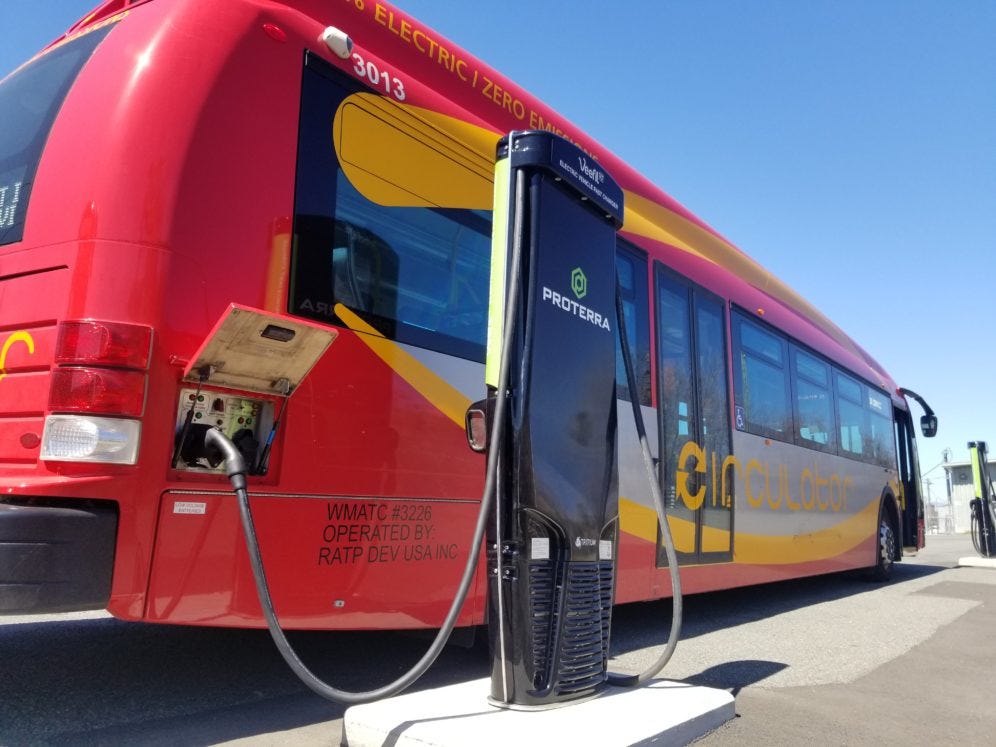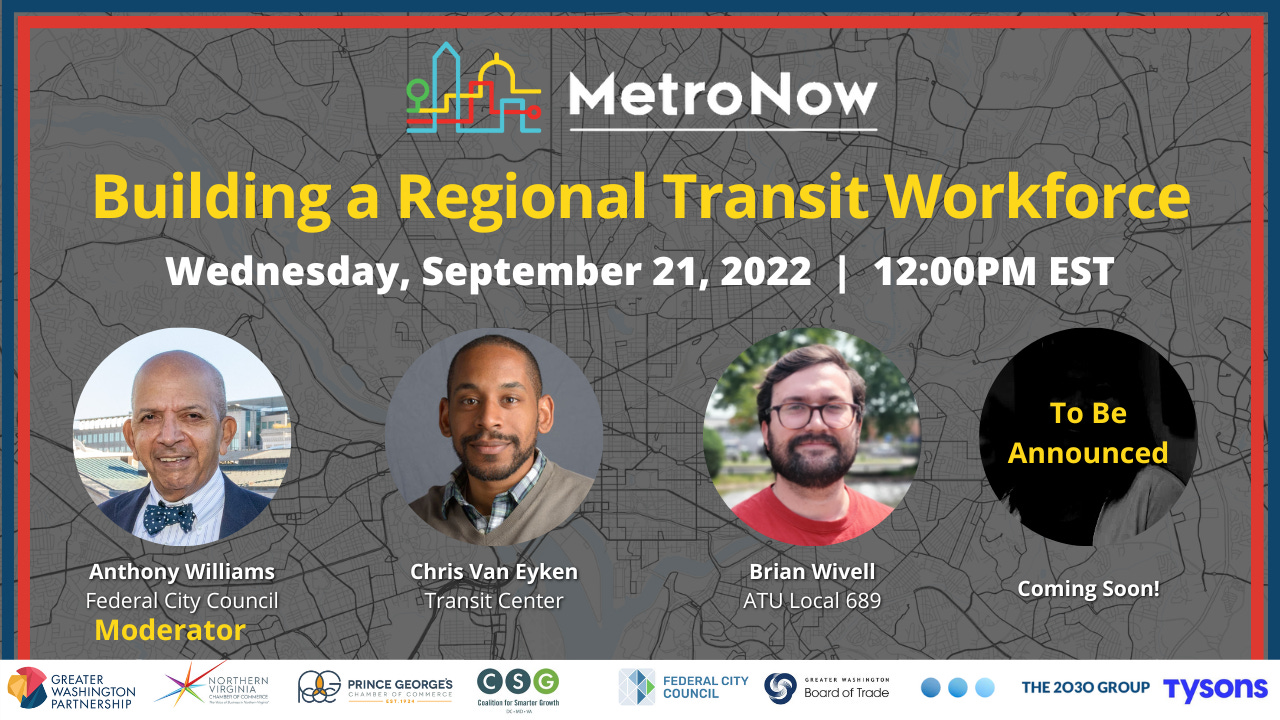MetroNow Dispatch 8.2022
In this month’s Dispatch, we reflect on Metro developments and the new GM, the transit benefits of more federal funding, and crown our latest Transit Champion 🚌. So long August, see you next year!
Notice of Correction: A change was made to last month’s Dispatch after publication in the“Next Stop, Fiscal Cliff; $356 Million Shortfall expected in 2023” section to reflect farebox recovery ratios (fare revenue compared to total operating expenses), an industry standard, rather than fare revenue compared to operating revenue.
Two Steps Forward, One Step Back: Metro Safety and Communication

WMATA’s new GM/CEO is already making changes to improve communications about transit services and disruptions. Randy Clarke has stepped up to the plate by engaging directly with front-line workers and the public from his first day on the job. Clarke’s public-facing response to a recent track fire (only days into his tenure), kept users informed of the incident and what WMATA was doing to fix it.
However, the ongoing oversight of WMATA by the Washington Metrorail Safety Commission (WMSC) reveals that the operator has much more work to do. This month, WMSC drew attention to poorly managed station control rooms which are considered a “vital” part of Metrorail’s safety systems according to the oversight agency.
WMSC mandated that WMATA improve these facilities after it found that the organization had failed to reach its own goals. On July 30, contrary to department policy, a train with passengers on board approached a track fire. This flagrant safety lapse indicates the organization still requires systemic and cross-agency efforts to improve its track record. Continued focus on incremental improvements to promote a culture of safety will be essential to put the agency on a better, safer, and more resilient path and support long-term ridership growth.
Read More:
Metro wants to be able to run more 7000-series trains. It needs oversight approval to do that. (GGWash 8.10.22)
“The proposed changes would ease the inspection burden on Metro’s railcar maintenance staff and would increase the number of railcars and trains available to be used in service.”
Metro ordered to clean up, regularly inspect control rooms (WaPo 08.04.22)
“The Washington Metrorail Safety Commission on Thursday said Metro has shirked pledges to clean up and inspect control rooms vital to Metrorail’s operations, prompting the regulatory agency to order that transit officials comply with a schedule of required cleaning, maintenance and inspections.”
Why a Red Line train with passengers on board headed towards a track fire (GGWash 08.03.22)
“The track fire during the evening of Saturday, July 30, caused Metro to suspend service on its Red Line between Van Ness and Farragut North until 11 am on August 1, about 38 hours later.”
Metro hires new chief operating officer (WaPo 08.02.22)
“Brian Dwyer, who has three decades of public transit experience in the private and public sectors, will start Aug. 8 and report to General Manager Randy Clarke, who is in his second week on the job.”
Webinar: Building a Regional Transit Workforce, Sept. 21
Next month the Federal City Council and Greater Washington Partnership will host a conversation about the transit workforce with special guests from Transit Center, the Amalgamated Transit Union (ATU), and more to be announced. Join these experts as they discuss the current state and future of America’s transit workforce, including the challenges facing front-line workers and agencies seeking to grow and retain the transit workforce. The one-hour webinar is free, and is scheduled for September 21, at 12pm. Register now! Tell your friends!
Missed our last webinar? Watch the recording of our June 30 conversation with speakers from DDOT, Dominion Energy and Transit Workforce Center!
Read More:
Bus Operators Are In Crisis. Here’s How Agencies Can Turn Things Around. (Transit Center 7.22)
“To tackle operator shortfalls, “Bus Operators in Crisis” makes the case that the transit industry must make driving a bus a good job, a job with dignity, a job that is respected, well compensated, and rewarding.”
Four challenges impacting the bus operator shortage across the US (GGWash 7.27.22)
“Not everyone understands just how valuable it is to have a pension and affordable healthcare,” said Chris Van Eyken, program manager for Transit Center and the author of the report. “The bus operator has traditionally been a really good way for working class, Black and brown folks to get a middle class job and advance in life. And as it degrades, it’s making it harder and harder for people to find ways to take a step up.”
Blue and Yellow Line Construction

Metro employees are hard at work on a number of projects along the Blue and Yellow lines. Metro shared a schedule of all planned work and a landing page for Blue and Yellow line projects on its website. The two-phased projects will begin September 10 and work will extend through May 2023. Seven free bus shuttles will be offered during phase one including local and express shuttles and VRE is offering free rides in September and select stations in October.
While we know that Metro closures are always extremely disruptive for the riders and businesses who depend on the system, we are excited to see WMATA upgrading our rail infrastructure and we look forward to experiencing the improvements, including the soon-to-open Potomac Yard Station.
Read More:
Major changes coming soon for Yellow, Blue line Metro riders (WTOP 8.24.22)
“Six Blue and Yellow line stations south of Ronald Reagan National Airport Station will be closed from Sept. 10 to Oct. 22, and the Yellow Line tunnel and bridge will remain closed for more repairs through May 2023.”
Federal Dollars Expand Low-Emissions Transit, A Big Step Towards Our Community and Climate Goals

On top of the RAISE grants awarded this month to advance the Long Bridge Bike-Ped Crossing, New Carrollton station improvements, and exciting multimodal projects around the region, the $1.6 billion in new grants from the Federal Transit Authority will nearly double the number of electric buses across the country. The Greater Washington Region will be a beneficiary of this funding, which will help to accelerate existing bus electrification efforts. DDOT received $9.6 million, Montgomery County, $15 million, and Prince George’s County, $25 million.
Read More:
New Carrollton train hall will unite train lines, bike lanes, retail (WaPo 8.25.22)
“The $47 million project, which this month received a $20.5 million federal grant, will help create a seamless space between all the modes of transportation in the area”
Infrastructure money to almost double zero-emission buses on road (WaPo 08.16.22)
“The money will be used to purchase about 1,800 buses — including 1,100 that aren’t dependent on fossil fuels — and to construct maintenance and charging facilities while training workers.”
Pedestrian, bike and transit projects in D.C. area get federal boost (WaPo 8.11.22)
“The projects are among five in the greater Washington region receiving nearly $60 million in federal funding under the Rebuilding American Infrastructure with Sustainability and Equity (RAISE) program.”
Transit Champion of the Month: Virginia Breeze, A Win For Inter-Community Mobility
The Transit Champion of the Month is the Virginia Breeze intercommunity bus service. Breeze operates mainly outside of Virginia’s Urban Crescent region, and was designed to address low connectivity between communities outside of Virginia's urban core. Over several years, Breeze has expanded from one line, the Valley Flyer, to four routes; each beginning in communities in the southern part of the state before extending northward, eventually reaching Dulles and terminating at Washington Union Station.
Breeze, a service provided by Virginia’s Department of Rail and Public Transportation in partnership with intercity bus operator Megabus, is one of only two subsidized intercity bus networks in the country. MetroNow is excited by the success of the Virginia Breeze transportation service and believes that intercommunity connectivity is critical to enabling visitors and residents alike to access and benefit from all that the region has to offer. MetroNow commends the system and looks forward to future expansions in the coming years.
Read More:
Virginia’s answer to Greyhound shows rural areas are worth serving (VA Mercury 08.12.22)
“There are a lot of people who regularly commute to D.C. who would much rather take this than pay for gas, parking and the hassle of having a car in a city.”
Subscribe + Share!
Sharing is caring! Share the MetroNow Dispatch with any friends, colleagues, or family members who want to join us for the ride!
Follow @MetroNow on Twitter for daily tidbits of transit gold.
Reach out to us directly with any feedback, hot takes, or ideas for future newsletter topics: info@metronow.com
The MetroNow Coalition is made up of regional leaders from the business, non-profit, and advocacy communities who believe that transit is designed to bring us together —at work, school, and play. Today, we believe our collective advocacy for better transit for the Washington DC region is more important than ever.
We launched the MetroNow Dispatch to bring residents, leaders, and transit agencies together to think about how we can make better transit today, during the pandemic, and “tomorrow,” as we look beyond recovery to how we can build a more equitable, sustainable, and accessible transportation system for our region.





